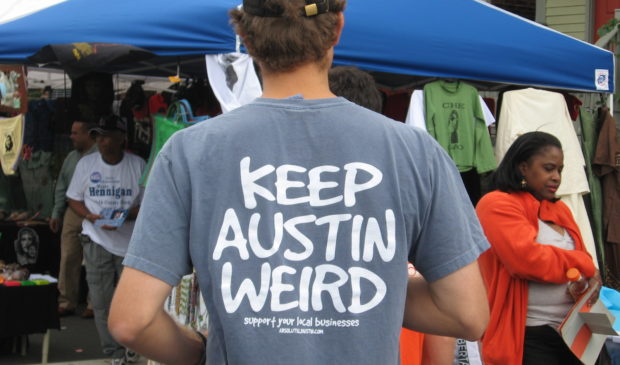Is Austin still weird?
Tuesday, September 27, 2022 by
Jo Clifton “Is Austin becoming less like itself?”
As four local politicians – Travis County Judge Andy Brown, County Attorney Delia Garza, Mayor Steve Adler and state Rep. Sheryl Cole – attempted to answer Austin American-Statesman reporter Ryan Autullo’s question at the Texas Tribune Festival Saturday, they reflected on their introductions to Austin.
During Delia Garza’s first visit to the city, she stood in line at Liberty Lunch, waiting in the rain to see Alanis Morissette. She also saw a man on a bicycle wearing only a G string. She recalled thinking that Austin really is weird.
Garza, who grew up in San Antonio and was accustomed to Hispanic culture and gatherings as a natural part of city life, was shocked when she moved to Austin after graduating from college and found none of the culture she was used to. Now, she said, Austin is celebrating Hispanic Heritage Month and she is grateful for the direction the city is moving.
Sheryl Cole arrived in Austin in 1982 to attend the University of Texas. She grew up in Wichita Falls, a smaller city she described as “semi-rural Texas.” She remembered going to the Frank Erwin Center to register for classes and seeing people protesting against the regime of Ruhollah Khomeini, the supreme leader of Iran. She called her mother and her grandmother, telling them she didn’t understand the people who were protesting because “they were all white.” Her grandmother told her to stay out of it. Cole concluded, “We’ve come a long way, Austin, in terms of protesting on various issues, but that is my fond memory of Austin protests.”
Steve Adler, who came to Austin in 1978 for law school, said, “The people who got here with me in ’78 were absolutely sure that the people who got here in ’79 were the ones who started screwing up the place. But I think everybody feels that way in Austin. The people who got here eight years ago think the people who got here four years ago” are ruining it all. When he came to Austin, the Hole in the Wall on the Drag was new, and people were suspicious of it. Then when the Armadillo left and Liberty Lunch left, people said things would never be the same. “And then Aqua Fest left,” and people said things would never be the same. But, “There are some things that will always be the same to me.”
Adler added, “Also when I got here in ’78, this was a really unique, creative place … and it was a place where the capacity for taking risks in order to create new things and ideas was higher than any city in the world. You can think outside the box … that is why there are so many startups. And in so many ways, this is still the magical place it was when I got here.”
Unlike the others, Andy Brown grew up in Austin, in the Hyde Park neighborhood, when it was much less expensive, relatively speaking, than it is now. A musician could afford to live in Hyde Park when he was growing up, he said, but that’s surely not the case now. On the other hand, Austin was much more segregated back then.
“The fact that this city and this county are growing so amazingly – it’s a different place than it was – it’s not the same weird place that it was when we came here,” he said. “It’s a different place, but it’s still great … and I think that’s our challenge in our local government, to make sure that people who want to be a musician or want to do other things that don’t pay as much as a job at Google or Facebook or whatever, that they still can afford housing here. I think that’s one of the challenges we’re facing.”
Adler added later that the city’s existential challenge is whether members of our creative community can still afford to live in Austin.
Editor’s Note: Andy Brown is on the board of the Capital of Texas Media Foundation, the parent nonprofit of the Austin Monitor.
Photo made available through a Creative Commons license.
The Austin Monitor’s work is made possible by donations from the community. Though our reporting covers donors from time to time, we are careful to keep business and editorial efforts separate while maintaining transparency. A complete list of donors is available here, and our code of ethics is explained here.
You're a community leader
And we’re honored you look to us for serious, in-depth news. You know a strong community needs local and dedicated watchdog reporting. We’re here for you and that won’t change. Now will you take the powerful next step and support our nonprofit news organization?




